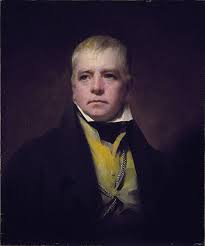I hold truth and mirth to be better than gravity and cunning – ay, and in the end to be a match for them. … A light heart, a just cause, and a good sword …
– Scott
This blog has been dedicated to Ireland, and to Michael Collins’ life and times. Yet it seems appropriate to digress for a moment, to consider the 200th anniversary of Walter Scott’s seminal first novel, Waverly.
This, the world’s first historical novel, is the story of a Gaelic nation, torn by unequal war with the British, in the cause of national autonomy. The parallels with Ireland are many, and remarkably close.
“The ’45” rebellion, which sought to place the Stewart, “Bonnie Prince Charlie” on the throne, rang in living memory, in Scott’s lifetime. He grew up in a country still recovering from armed conflict; not entirely unlike the present generation in Northern Ireland. Bred to the legal profession, his position in the courts as Clerk of Session, and later as Sheriff, gave him first-hand experience of those regions where the British writ still did not run with universal effectiveness.
First an admirer, and later friend, of Maria Edgeworth, he set out to do for Scotland what she had done for Ireland, in her novels Castle Rackrent and The Absentee. Scotland’s complex tensions, colourful traditions, sharply contrasting cultures and interests, were realistically personified in the characters of his tales, with remarkable faithfulness, affection and respect.
Waverly was the first of a series: followed by the now-better-known Ivanhoe and Rob Roy. They won him a place among the great masters of the language; one whose work had a lasting impact on the way it is used. Ironically enough, not being an Englishman at all. His surname is said to be derived from “Scoti”, the ancient tribe which gave its name to his country.
Through his writings and publishing business, he became a great patron of Scottish folklore and literature. From The Minstrelsy of the Scottish Border, to his discovery of James Hogg “The Ettrick Sheperd”, he was personally responsible for preserving much that would otherwise have been lost to posterity forever.
His influence was not confined to his own island. On the contrary, it extended all over the world. Alexander Pushkin, now regarded as the father of modern Russian literature, was an avid reader of The Edinburgh Review. “The Byron of Russia”, as he was called, emulated Scott as well, in both poetry and prose. As seen in “The Lay of Wise Oleg”
They sing of their youth,
Of the days of their pride,
Of the frays where together,
They struck side by side…
But above all in one of the first novels written in Russian, The Captain’s Daughter. Pushkin was researching his history of the Pugachov Rebellion of 1773, when he brought out this historical novel, set in the midst of that upheaval. The hero’s travails, falling in with the rebels, and later prosecuted as a traitor, closely reflect the plot of Waverly.
All of the above-mentioned works are highly recommended to anyone who wishes to deepen their understanding of the history of imperialism, and the struggles for self-determination which it has given rise to.
Or, … If you’re just looking for a great read, filled with unforgettable characters, colourful times & places, thrills, chills, and excitement.
Read more:
Waverly
http://en.wikipedia.org/wiki/Waverley_%28novel%29
Waverly on Amazon
http://www.amazon.com/Waverley-Penguin-Classics-Walter-Scott/dp/014043660X
Walter Scott
http://en.wikipedia.org/wiki/Walter_Scott
The Waverly Novels
http://en.wikipedia.org/wiki/Waverley_Novels



